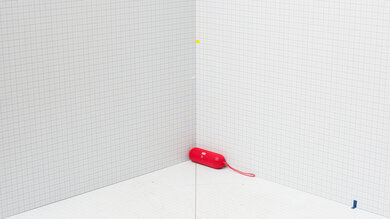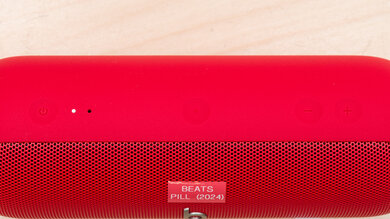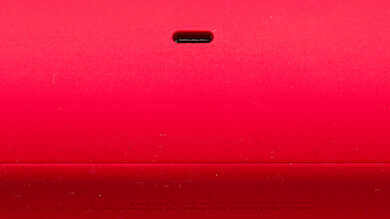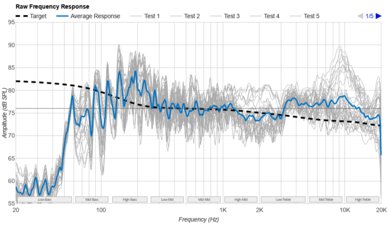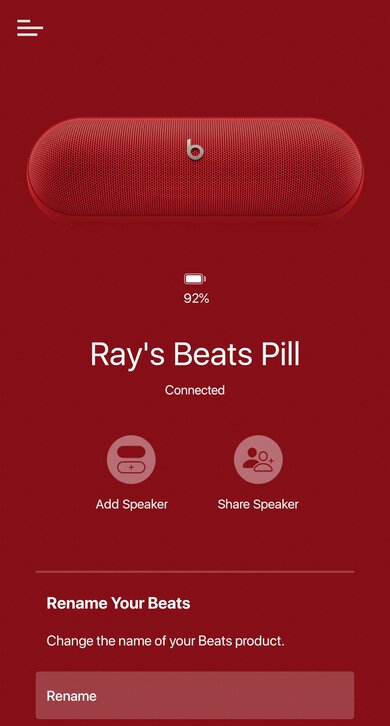The Beats Pill is a revamped portable speaker from Beats, building on the blueprint of the discontinued Beats Pill+. The release of this new Pill was accompanied by a marketing campaign that featured the likes of LeBron James and Lil Wayne, continuing Beats' storied tradition of celebrity endorsements. This campaign focused on the Pill's loudness relative to its size. The manufacturer also claims it can last for up to 24 hours on a single charge, and many users will appreciate the potential for wired playback via USB-C, which includes support for high-resolution streaming. So, does this speaker live up to the hype? Or is the marketing just a way to sweeten the pill?
Our Verdict
The Beats Pill 2024 is acceptable for music. Its default frequency response is more balanced than its predecessor, with smoother mids and better bass extension. The treble range is quite bright, though, and sibilants, like cymbals, can sound harsh at times. There's no EQ or presets in the app to tune the sound to your liking, either. While it can get reasonably loud, it's hardly enough to warrant noise complaints (despite what the marketing might indicate), and there's a decent amount of compression at max volume. It also can't playback stereo content without downmixing to mono, though you can pair another speaker for stereo playback. Its directivity isn't bad for a uni-directional speaker, too, so audio sounds consistent across different angles.
- Portable and well-built.
- Reproduces speech and voices well.
- IP67 rating against water and dust damage.
- No Bluetooth multipoint.
- Can't playback stereo content.
- Barebones app with no EQ.
The Beast Pill is mediocre for videos and movies. While it has a balanced mid-range response that's great at reproducing dialogue, it lacks the requisite low-bass to add rumble to action scenes, plus its over-emphasized treble range can cause some higher-frequency sound effects to sound harsh. It can't get loud enough for larger viewing parties either, and its inability to playback stereo content can hamper the immersive quality of movie audio (though you can always pair a second speaker for stereo playback). On the upside, latency with Android devices is solid and even lower with iOS devices, so you won't experience many lip-sync issues. Different devices and apps compensate for latency differently, though.
- Reproduces speech and voices well.
- Can't playback stereo content.
The Beats Pill is decent for podcasts. It features a much more balanced mid-range than its predecessor that renders your favorite hosts voices in a detailed, natural way. While it can't get too loud, it's enough for podcast audio to still be audible if you're cooking with the ventilator on, for example. It's also portable enough to carry around from room to room. Its directivity isn't bad either, although you'll still want to be careful about how you position yourself relative to the speaker.
- Portable and well-built.
- Reproduces speech and voices well.
- No Bluetooth multipoint.
- Barebones app with no EQ.
The Beats Pill has decent voice assistant performance. While it doesn't feature built-in voice assistant support, it can work with a Siri or Google Assistant-compatible smartphone. It does an excellent job of picking up voice commands, even if you're far away from the speaker or in a crowded environment.
- Microphone picks up commands easily.
- Barebones app with no EQ.
The Beats Pill isn't a bad speaker for outdoor use. It's rated IP67 for protection against dust and water damage and can even be submerged in water. That said, if you're planning on cranking the volume to near max, the battery will only last you a little over seven hours. On the upside, its small form factor and detachable lanyard make it extremely portable, and it has a pretty balanced frequency response for such a small speaker.
- Portable and well-built.
- IP67 rating against water and dust damage.
- No Bluetooth multipoint.
- Can't playback stereo content.
Changelog
-
Updated May 29, 2025:
The App box was updated to mention the JBL Flip 7.
-
Updated Mar 21, 2025:
We've updated this review to clarify the speaker's iOS app functionality. When used with an iOS device, the speaker's functions can be controlled through the device's settings screen.
-
Updated Feb 18, 2025:
We retested the Frequency Accuracy Response after updating to firmware 2C336, but there was no change in performance.
-
Updated Oct 21, 2024:
We added a reference to the 'Kim Kardashian Light Gray' and 'Kim Kardashian Dark Gray' variants to this review.
Check Price
Differences Between Sizes And Variants
The Beats Pill 2024 comes in five color variants: 'Matte Black,' 'Statement Red,' 'Champagne Gold,' 'Kim Kardashian Light Gray,' and 'Kim Kardashian Dark Gray.' We tested the 'Statement Red' variant, but we expect all color variants to perform similarly. You can see our unit's label here.
If you encounter another variant of this speaker, please let us know in the comments, and we'll update our review.
Popular Speaker Comparisons
The Beats Pill is a continuation of Beats' popular line of speakers, which was discontinued after the 2015 Beats Pill+. Compared to its predecessor, it has a better build quality, a more balanced sound, and support for Siri and Google Assistant via a compatible smartphone. That said, some features are notably missing, including Bluetooth multipoint support and stereo playback. That said, its overall performance is still on par or better than the similarly-sized JBL Flip 6, which lacks voice assistant support and has a shorter battery life but features multi-device pairing.
See also our recommendations for the best Bluetooth speakers, the best cheap speakers, and the best Bluetooth speakers for bass.
The Bose SoundLink Flex and the Beats Pill are similarly sized speakers with detachable carrying straps. In terms of performance features, there's not a whole lot to differentiate the two. They're neck and neck when it comes to volume, battery life, and portability, and even their default sound profiles are very similar. That said, the Beats has the ability to play audio via a wired source through the USB-C port and can even play back high-resolution content from a compatible streaming service. The Bose supports Bluetooth multi-device pairing though, so choosing between them may come down to which connectivity options you prefer.
The JBL Flip 6 and the Beats Pill are similarly-proportioned speakers. While they perform similarly in most areas, there are some key differences that can help you choose between them. The JBL is better-built, has better directivity and offers a graphic EQ in the companion app for additional sound customization. However, the Beats has the more balanced sound out-of-the-box, a longer battery life and features some voice assistant support via the Siri or Google Assistant capabilities of your smartphone. As a result, the JBL is a better fit for users that care about tuning the sound to their preferences and want more consistent sound from all angles. The Beats is a better choice for those that value voice assistant support and need the longer battery life for on-the-go use.
The JBL Charge 5 and the Beats Pill are both lightweight, portable speakers, although the Beats has a smaller form factor. The Beats is a great choice for those who need voice assistant support and own an Android or iOS device, as it works with Siri and Google Assistant via a compatible device. It can also play back audio via a wired connection, including lossless audio if you have the right streaming service subscription. The JBL is a better choice for those who want control over their sound, though, as it features a graphic EQ and presets in the companion app. It also has a substantially longer battery life that may sway users who want to take it on longer trips.
The JBL Flip 5 and the Beats Pill are similarly-sized portable speakers with detachable carrying straps. While both offer a similar performance, there are some differences in features that can influence your buying decision. The Beats has a more balanced default sound, with a less recessed treble range and slightly better bass extension. It also compresses less at max volume and is compatible with Google Assistant and Siri if paired with an iPhone or Android phone, making it a better choice for users that use voice commands. The JBL features Bluetooth multi-device pairing though, which can be useful if you and a friend want to share tune selection duties. The JBL is also retails for less and comes in a wider variety of color variants. All in all, the JBL is a good choice for those who want a portable speaker on a budget, but the Beats' superior sound and voice assistant compatibility could be worth the additional outlay.
Test Results

This speaker is outstandingly portable. It has a small, lightweight form factor that lends itself to being carried in one hand. The detachable lanyard also helps with this as you can fasten it on your person in case you don't have a hand free.
This speaker has a very good build quality. It feels well-built and solid as the construction uses mainly rubber, with aluminum grilles. Both materials are pleasingly scratch-resistant. The speaker is rated IP67 for protection against submersion in water, as well as dust. It's not advertised to float in water, and our testing confirmed this, as while the speaker didn't sink, only half of it stayed above the water consistently.
Furthermore, after testing the speaker's buoyancy, we had issues charging via the USB-C port, as well as using USB audio. While the device was able to charge again and receive audio after the port had dried out, we'd advise you to avoid prolonged exposure or submersion to water as this can cause issues with power and audio delivery.
This speaker has very good controls. You can see quick overview of the controls here. All the buttons are nicely indented and feel tactile. There's also audio feedback for when you power the speaker on/off, as well as for pairing. Sadly, there's no audio feedback for when you hit max volume. The single LED on the top of the speaker also changes color according to the battery level, with green indicating there's more than 20% battery left and red indicating low battery.
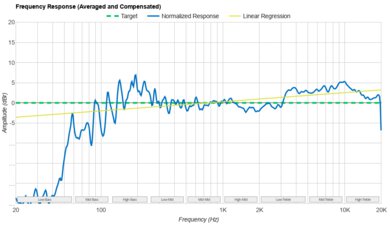
The Beats Pill has a decent frequency response. It's a step up from its predecessor, the Beats Pill+, and features a much more balanced mid-range with better bass extension. We tested the speaker horizontally, and while it lacks the low-end oomph of larger speakers, it's still possible to hear kicks and basslines in genres like EDM and hip-hop, even if they don't sound substantial. The balanced mid-range is great at rendering vocals and podcast speech with detail, though. However, there's some over-emphasis in the treble range that can make sibilants, like cymbals, sound harsh and overly bright. After updating to firmware 2C336, there was no noticeable difference in this area. Unfortunately, there's no EQ in the app to let you adjust the sound to your liking.
We also tested this speaker's ability to playback high-resolution content over a wired USB connection and found only a marginal difference compared to Bluetooth playback, with slightly more low-end present in certain tracks.
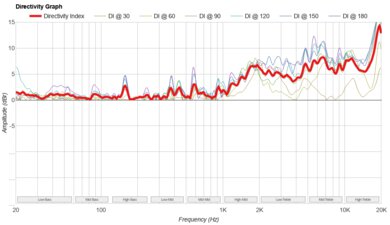
This speaker has a sub-par soundstage performance. Unlike its predecessor, the Beats Pill+, it can't playback stereo content and has to downmix to mono. You can always pair a second Pill for stereo playback, though. Its directivity is decent, but you'll still want to be careful about how you position yourself around the speaker to ensure you get a balanced sound.
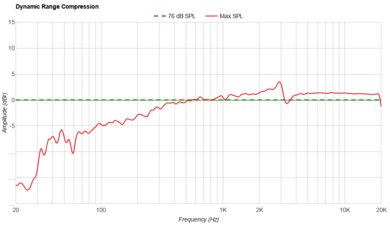
The dynamics performance is mediocre. As you'd expect from a small speaker, it doesn't get particularly loud, and there's some compression present at max volume, especially in the bass range.
It has an okay battery life performance. The manufacturer advertises up to 24 hours of continuous battery life at 50% volume. However, we tested the speaker at 80dB (one notch away from max volume) and achieved around 7.5 hours. While these results seem disparate, it's likely that battery life diminishes much quicker when the speaker is playing at a higher volume, and battery life varies depending on usage. Fortunately, this speaker has a 20-minute auto-off timer that can help preserve battery life, as well as a feature that gives you two hours of playback from ten minutes of charge time. You can also use the USB-C port to charge your other devices, though this will also diminish the battery quicker.
This speaker works with both Google Assistant and Siri via a compatible device, as it has no built-in voice assistant support. It does a great job of picking up your voice, though, even if you're far away or in a noisy space.
The Beats app is okay, though it's a little barebones. If you have an Android device, it lets you pair the speaker with another Pill for stereo playback ('Stereo') or party mode ('Amplify'). You can also rename the speaker and check the battery level. Unfortunately, there's no graphic EQ or presets available to tune the speaker's sound. For those who want more control over the sound, the JBL Flip 7 is an alternative with a graphic EQ and presets to tweak the tuning to taste. If you have an iOS device, the speaker's functions are integrated into the existing iOS settings, like other products in the Apple ecosystem. With iOS, if you want to pair two Pill speakers for stereo or party mode, you'll have to use the speakers' buttons.
This speaker has a single USB-C port that's used for charging. It can also be used to charge other devices, as well as for audio playback if you connect it to another USB-C-compatible device. The manufacturer advertises that it's capable of playing back high-resolution audio content this way, too. However, we observed that it was unable to connect via USB to Android phones but had no issue with laptops or iOS devices, which is worth noting if you're an Android user who's looking to play audio via a wired connection.
This speaker has great Bluetooth connectivity. While it doesn't support multi-device pairing, it has outstandingly low latency with iOS devices and a decent latency with Android devices, too. This should mean that you won't experience any sync issues between your audio and video, though different devices and apps compensate for latency differently.


